-

新人教版高中英语必修3Unit 2 Morals and Virtues-Listening &Speaking&Talking教学设计
Example:One day, a poor boy who was trying to pay his way through school by sending newspapers door to door found that he only had one dime(一角)left. He was so hungry that he decided to beg for a meal at the next house.However, he lost his nerve when a lovely young woman opened the door. Instead of a meal he asked for a drink of water. She thought he looked hungry so she brought him a large glass of milk. He drank it slowly, and then asked, “How much do I owe you?” “You don’t owe me anything,” she replied, “Mother has taught me never to accept pay for a kindness.” “Then I thank you from the bottom of my heart.” With these words, Howard Kelly left that house.Years later the woman became badly ill and was finally sent to the hospital in a big city. Dr. Howard Kelly, now famous, was called in. When he heard the name of the town she came from, a strange light filled his eyes. Dressed in his doctor’s clothes, Dr. Kelly went into her room and recognized her at once. From that day on, he gave special attention to her, and decided to do his best to save her life.At last the woman was saved. Dr. Kelly asked the business office to pass the final bill to him. He looked at it and then wrote something on the side. The bill was sent to the woman’s room. She was afraid to open it because she was sure that it would take the rest of her life to pay for it off. Finally she looked, and the note on the side of the bill caught her attention. She read these words: “Paid in full with a glass of milk, Dr. Howard Kelly.” Tear of joy flooded her eyes.

新人教版高中英语必修3Unit 2 Morals and Virtues-Reading and Thinking教学设计
The topic of this part is “Learn to make choices in life”.The Listening & Speaking & Talking part aims at the moral dilemmas, and this part is about making choices in life. The heroin is Lin Qiaozhi, a famous medical scientist, made a great contribution to our country’s medical care. Most importantly, her life experience can inspire our students whether in studying or the development of career. she had moral dilemmas and life choices, which are similar to the students who will step into society. Besides, Lin has quite good virtues like kindness, self-improvement, insistence, job-loving , generosity and responsibility, which is worth being learned.Concretely, this article is a biography about Lin Qiaozhi. The article tells her whole life according the timeline, among which the life choices is emphasized. For example, whether married or chased her dream, returned home or stayed abroad, family or public, her choices all reflected her faith, spirit, responsibility and devotion.1. Fast reading to get the detailed information about Lin Qiaozhi; careful reading to do the deductive information.2. Learn the reading skills--deductive judgement according the context.3. Study the structure features and language features. 4. Communicate about Lin’s life choices and reflect their own life choices.1. Learn the reading skills--deductive judgement according the context.2. Study the structure features and language features.3. Communicate about Lin’s life choices and reflect their own life choices.Step 1 Lead in---Small talkWhat are some important life choices?Importance choices: university study, jobs and marriage partners. Because they can determine our future.

新人教版高中英语必修3Unit 4 Space Exploration-Discovering Useful Structure教学设计
The theme of the section is “Describe space facts and efforts to explore space”. Infinitives are one of non-finite verbs, as the subjects, objects, predicative, attributes and adverbials. This unit is about space exploration, which is a significant scientific activity, so every scientific activity has strong planning. Therefore, using the infinitives to show its purpose, explanations or restrictions is the best choice.1. Learn the structure, functions and features of infinitives.2. Learn to summarize some rules about infinitives to show purpose and modify.3. Learn to use infinitives in oral and writing English. 1. Learn the structure, functions and features of infinitives.2. Learn to summarize some rules about infinitives to show purpose and modify.3. Learn to use use infinitives in oral and writing English.Step 1 Lead in---Pair workLook at the following sentences and focus on the italicized infinitives. In pairs, discuss their functions. 1. I trained for a long time to fly airplanes as a fighter pilot..(作目的状语)2. As we all know, an astronaut needs to be healthy and calm in order to work in space..(作目的状语)3. First of all, you must be intelligent enough to get a related college degree..(作目的状语)4. Some scientist were determined to help humans realise their dream to explore space..(作定语)5. On 12 April 1961, Yuri Gagarin became the first person in the world to go into space..(作定语)Summary:1. 不定式的结构:to+do原形。2. 分析上面的句子,我们知道在描述太空探索时,动词不定式不仅可以用来表目的,还可以用来作定语,表修饰。

新人教版高中英语必修3Unit 4 Space Exploration-Listening&Speaking&Talking教学设计二
The themes of this part are “Talk about how to become an astronaut” and “Talk about life in space”. As Neil Armstrong said “Mystery creates wonder and wonder is the basis of man’s desire to understand. Space is difficult for human to reach, therefore, humans are full of wonders about it. However, if wanting to achieve the dream of reaching the Moon, some of our human should work hard to be an astronaut at first. Part A(Talk about how to become an astronaut) is a radio interview in a radio studio, where the host asked the Chinese astronauts about his story how to become an astronaut. Yang Liwei told his dreamed to be an astronaut since childhood. Then he worked hard to get into college at 22. The next 10 years, he gradually became an experienced pilot. At the same time, to be an astronaut, he had to study hard English, science and astronomy and trained hard to keep in good physical and mental health and to practise using space equipment. Part B (Talk about life in space) is also an interview with the astronaut Brown, who is back on the earth. The host Max asked about his space life, such as his emotion about going back the earth, the eating, shower, brushing, hobbies and his work. Part A and Part B are interviews. So expressing curiosity about the guests’ past life is a communicative skill, which students should be guided to learn.1. Students can get detailed information about how Yang Liwei became an astronaut and Max’s space life.2. Students learn to proper listening strategy to get detailed information---listening for numbers and taking notes.3. Students can learn related sentences or phrases to express their curiosity like “ I wish to know...” “I’d love to know...”4. Students can learn more about the space and astronauts, even be interested in working hard to be an astronaut

新人教版高中英语必修3Unit 4 Space Exploration-Reading for Writing教学设计二
⑦在我看来, 探索太空是值得的。As far as I am concerned, it is worthwhile to explore the space.Step 10 Writing---draftRecently, students in our class have had heated a discussion on whether space is worth exploring. Students hold different ideas about it.30% of us think space exploration is not worthwhile. They think space is too far away from us and our daily life and is a waste of money. And the money spent on space exploration can be used to solve the earth’s problems such as starvation and pollution.On the other hand,70% think space is worth exploring because we have benefited a lot from it,such as using satellites for communication and weather forecast. What’s more,with further space research,we may solve the population problem by moving to other planets one day. Also,space research will enable us to find new sources to solve the problem of energy shortages on the earth.As far as I am concerned, it is worthwhile to explore the space. Not only can it promote the development of society but also enrich our life. Step 11 Pair workExchange drafts with a partner. Use this checklist to help your partner revise his/her draft.1.Does the writer explain why he/she changed/wanted to change?2.Does the writer tell how the changes have improved or will improve his/her life?3.Is the text well-organised?4.Does the writer use words and expressions to show similarities and differences?5.Are there any grammar or spelling errors?6.Does the writer use correct punctuation?

新人教版高中英语必修3Unit 5 The Value of Money- Discovering Useful Structure教学设计
Step 3 Meaning1. 过去将来时表示从过去某一时间来看将要发生的动作或存在的状态, 常用在宾语从句中。一般由“would/should +动词原形”构成。She hoped that they would meet again someday. 她希望将来有一天他们能再见面。2. was/were going to+动词原形: 表示过去将要发生或很有可能发生的动作, 常用于口语中, 表示预言、意图或者打算等。He was going to start work the following week. 他打算下星期开始工作。3. was/were about to do: 常用来表示即将发生的动作, “刚要/正要做……”。注意该结构不与任何时间状语连用。I felt that something terrible was about to happen. 我感到某种可怕的事情即将发生。4.was/were to do: 表示“曾计划做某事”, 如果表示“本来计划做某事, 动作没实现”, 则需用 “was/were to have done”。She said she was to have told me about the accident. 她说她本来想告诉我关于事故的事。5.Start, go, come, leave, see, meet等动词的过去进行时: 表示就过去某一时刻而言即将发生的动作。She was coming later. 她随后就来。I had just put on my overcoat and was leaving to visit a friend of mine. 我刚穿上外套要去看我的一个朋友。

新人教版高中英语必修3Unit 5 The Value of Money-Listening &Speaking&Talking教学设计
4. A:We’d like to have someone to say a word at the beginning to welcome the group.B:↙Who?A:We thought that you or Dr.Johnson might do it.B用降调说Who,其意思是问,对方想让谁在开场时致欢迎词。Step 6 Pronunciation---Practice1. Listen to the short conversation and mark the intonation with ↗, ↙ or ↙, ↗. Then discuss with a partner what they intend to convey by using different intonation.Owner: You know what ?↗ It’s a million-pound bank note↙.Waiter 1: Really ?↗(question)Waiter 2: Really !↙(unbelievable and surprised)Waiter 3: Really ?!↙↗(first question then surprised)2. Listen to the conversations. Underline the parts that are stressed and mark the intonation. Then talk about the implied meanings of the responses with different intonations. Listen again and repeat.1) Henry: It’s a nice suit.Owner: Oh, it’s perfect!↙(The intonation means it is very suitable for Henry.)2) Henry: Well, that’s very kind of you.Owner: Kind, sir ?↗(what you said is not right) No, it’s kind of you. You must come whenever you want and have whatever you like. Just having you sit here is a great honour !!↙(welcome you to come again)3)Henry:Well, to be honest, I have none. Oliver:(happily) What luck!(excited) Brother↗, what luck!↙(It means “Didn’t you hear it?”)Henry: Well, it may seem lucky to you but not to me!↗(angry) If this is your idea of some kind of joke, I don’t think it’s very funny. Now if you’ll excuse me, I ought to be on my way.↙(If so, I would leave.)Roderick: Please don’t go↙...(hope Henry can wait for a moment)Part B Viewing and Talking---Describe people’s changing attitudes in a film clipStep 1 Before-listening---Tell the filmYou are going to watch part of the film The Million Pound Bank Note. Look at these photos and guess what happens in the film.

新人教版高中英语必修3Unit 5 The Value of Money-Listening &Speaking教学设计
Step 4: Listen again and decide if the following statements are true (T) or false (F).1 It was the first time Chen Liyan's story was reported. T口 F口2 Chen found 10,000 yuan in a small plastic bag in Taiyuan railway station口 F口3 Wang Zheng apologized to Chen because he couldn't offer her more money. T口 F口4 Chen took out a large loan to cure her daughter, T口 F口5 Wang set up a fundraising website for Chen's daughter after Chen told him about her situation. T口 F口Step 5:After listening, discuss the questions.1 What kind of person do you think Chen Liyan is?Chen Liyan is generous and honest because she returned a large sum of money to the owner.2 Did Chen return the money because she didn't need it?No. She returned the money because it was the right thing to do. Evidence for this is that she refused to accept the reward money because she felt that it had not been earned. 3 Is it common for people to do what Chen did?It depends on the culture. In some countries it is quite common to return money that has been found. In other countries, people believe "Finders are keepers!" 4 How did Wang Zheng feel about the return of his money?He must have been very happy and relieved to have gotten his money back. We know this because he thanked Chen repeatedly and even offered her a reward.5 Why did Ma Dongbao tell Wang about Chen's family?He must have had great sympathy for Chen and her daughter and wanted to help them.'We know this because he arranged help for them. 6 How did the news reporter feel about Chen's actions?The news reporter felt that it showed that money wasn't the most important thing in life. We know this because the reporter told us that this is what Chen believes. and then said, “that's a great attitude to take."

新人教版高中英语必修3Unit 5 The value of money-Reading and Thinking教学设计二
? Could you offer me some kind of work here?? I don’t want your charity, I just want an honest job.? Careless: I landed in Britain by accident.Step 7:Consolidation.? Find Henry? Roderick and Oliver were I .making a bet when they saw Henry, a poor young man. ? Know Henry? About a month ago, Henry was sailing and later he found himself carried out to sea by a strong wind. Fortunately, he 2.was spotted by a ship. And it was the ship that brought him to 3.England? Offer money to Henry ? Oliver and Roderick gave Henry a letter and told him that there was money in it. They 4.persuaded him to accept it, and made him 5.promise that it wouldn't be opened until 2 o'clock.Step 8:Language pointsa large amount of: a large quantity of; a great deal ofe.g. They bought a large amount of furniture before they moved their new house.make a bet: make an arrangement to risk money, etc. on an event of which the result is doubtful.e.g. We made a bet on the result of the match.permit sb to do something: allow somebody to do somethinge.g. My mother doesn’t permit me to ride in the street after it rained.by accident: as a result of chancee.g. I only found it by accident.stare at: look at somebody or something with the eyes wide open in a fixed gaze( in astonishment, wonder, fear, etc)to be honest: to tell you the truth; to be franke.g. To be honest, I don’t think we have a chance of winning.Step7 Homework:What do you think will happen to Henry? Will the bank-note help him or get him into trouble?

新人教版高中英语必修3Unit 5 The Value of Money-Reading for Writing教学设计二
2. 您能看到, 我头发太长了。You can see that my hair is much too long.3. 无论什么时候, 只要您想回来就回来。Please come back whenever you want.4. 您仅有很少的头发要理! You only have too little hair to cut !5. 为您服务是我的荣幸!It is my honour to serve you!Step 9 Writing(Henry is walking down the street when he sees a sign for a place that cuts hair. He decides to have it cut. )H=Henry B=BarberH: Good afternoon, I’d like to have my hair cut, if I may. (The barber looks at Henry’s hair and continues cutting another man’s hair. ) Er, I’d really like a haircut. As you can see it’s much too long. B: (in a rude manner) Yes, I can see that. Indeed, I can. H: Fine, well, I’ll have a seat then. (He sits in one of the barber’s chairs. The barber turns to look at Henry. )B: It’s quite expensive here, you know! Are you sure you can afford it?H: Yes. I think so. (After his hair is cut, the barber tells Henry how much he must pay. Henry shows the barber the bank note. )B: Why Mr. . . (looks shocked)H: Adams. Henry Adams. I’m sorry. I don’t have any change. B: Please don’t worry! (wearing a big smile) Nothing to worry about! Nothing at all! Please come back whenever you want, even if you only have too little hair to cut! It will be my honour to serve you!Step 10 Pair workExchange drafts with a partner. Use this checklist to help your partner revise his/her draft.1. Are all the elements of a play included and in good order ?2. Do the character use suitable language ?3. Are the stage directions clear and useful ?4. Is the plot clear and exciting enough ?
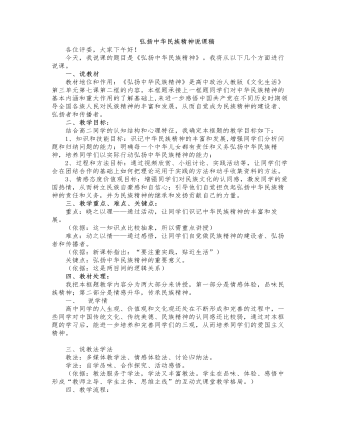
人教版高中政治必修3弘扬中华民族精神说课稿
3、评:以评促行。(6分钟)高中生的年龄特点决定了他们非常重视别人对自己的评价,渴望得到他人的肯定与鼓励。(所以我在班上组织一个活动:让同学们评选出班上“讲文明懂礼貌的文明之星”、“勤思考善创新的学习之星”(先让同学推举大家都认同的4位同学,然后对他们进行投票,投票结果将在下堂课上公布)以此活动来激发同学们用实际行动做民族精神的践行者和传播者。)4、唱:以情激行。(2分钟)在课程内容讲授结完毕后,组织全班同学跟着音乐高唱孙楠的《红旗飘飘》,生化情感,激发同学们的爱国情感。五、课堂拓展(请同学们各展才华:课后让同学们各自准备一个项目以体现民族精神。(项目形式是:或作文、书画;或剪纸、或歌曲小品)……让同学们用实际行动祝愿我们伟大的祖国更加繁荣昌盛!让我们的民族精神代代相传!)
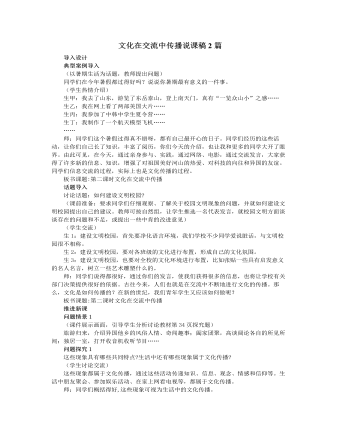
人教版高中政治必修3文化在交流中传播说课稿2篇
师:同学们这个暑假过得真不错呀,都有自己最开心的日子。同学们经历的这些活动,让你们自己长了知识,丰富了阅历,你们今天的介绍,也让我和更多的同学大开了眼界。由此可见,在今天,通过亲身参与、实践,通过网络、电影,通过交流发言,大家获得了许多新的信息、知识,增强了对祖国美好河山的热爱、对科技的向往和异国的友谊。同学们信息交流的过程,实际上也是文化传播的过程。板书课题:第二课时文化在交流中传播话题导入讨论话题:如何建设文明校园?(课前准备:要求同学们仔细观察、了解关于校园文明现象的问题,并就如何建设文明校园提出自己的建议。教师可按自然组,让学生推选一名代表发言,就校园文明方面谈谈存在的问题和不足,或提出一些中肯的改进意见)(学生交流)生1:建设文明校园,首先要净化语言环境,我们学校不少同学爱说脏话,与文明校园很不相称。
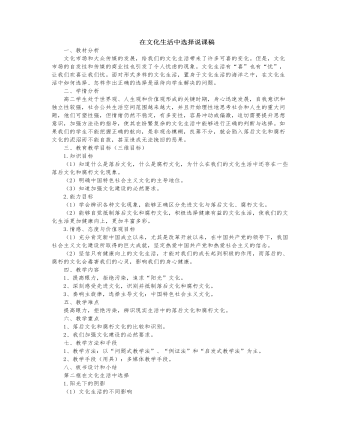
人教版高中政治必修3在文化生活中选择说课稿
一、教材分析文化市场和大众传媒的发展,给我们的文化生活带来了许多可喜的变化。但是,文化市场的自发性和传媒的商业性也引发了令人忧虑的现象。文化生活有“喜”也有“忧”,让我们欢喜让我们忧。面对形式多样的文化生活,置身于文化生活的海洋之中,在文化生活中如何选择、怎样作出正确的选择是亟待向学生解决的问题。二、学情分析高二学生处于世界观、人生观和价值观形成的关键时期,身心迅速发展,自我意识和独立性较强,社会公共生活空间范围越来越大,并且开始理性地思考社会和人生的重大问题,他们可塑性强,但情绪仍然不稳定,有多变性,容易冲动或偏激,迫切需要提升思想意识,加强方法论的指导,使其在纷繁复杂的文化生活中能够进行正确的判断与选择。如果我们的学生不能把握正确的航向,是非观念模糊,良莠不分,就会陷入落后文化和腐朽文化的泥沼而不能自拔,甚至造成无法挽回的恶果。
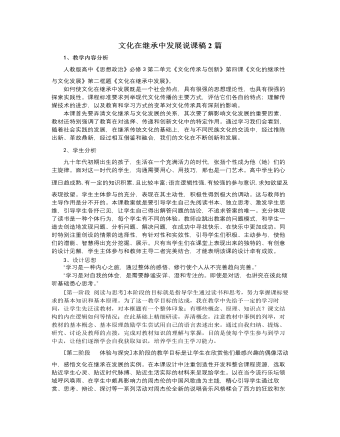
人教版高中政治必修3文化在继承中发展说课稿2篇
2、学生分析 九十年代初期出生的孩子,生活在一个充满活力的时代,张扬个性成为他(她)们的主旋律。面对这一时代的学生,沟通需要用心、用技巧,那也是一门艺术。高中学生的心理日趋成熟,有一定的知识积累,且比较丰富;语言逻辑性强,有较强的参与意识,求知欲望及表现欲望。学生主体参与的充分,表现在其主动性,积极性得到极大的调动。这与教师的主导作用是分不开的。本课教案就是要引导学生自己先阅读书本、独立思考、激发学生思维,引导学生各抒己见,让学生自己得出解答问题的结论,不追求答案的唯一。充分体现了读书是一种个体行为,每个学生有不同的体验。教师应跳出教案的问题模式,和学生一道去创造地发现问题、分析问题、解决问题,在成功中寻找快乐、在快乐中更加成功。同时特别注重创设的情景的选择性,有针对性和实效性,引导学生们积极、主动参与,使他们的潜能、智慧得出充分挖掘、展示。只有当学生们在课堂上表现出来的独特的、有创意的设计见解,学生主体参与和教师主导二者完美结合,才能表明该课的设计卓有成效。
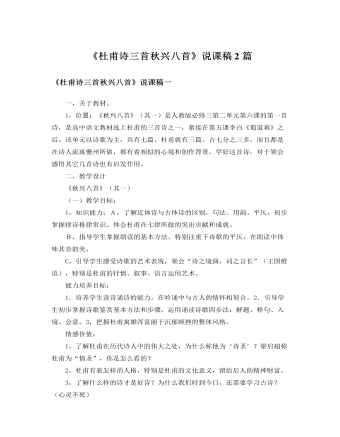
人教版高中语文必修3《杜甫诗三首 秋兴八首》说课稿2篇
师:“两开”是什么意思啊?注解里是怎么说的?第二次开,也就说他在这个地方已经待了两年了,这里是他回家的路途中,是不是?路途中他停留了两年时间。好的,你先请坐。你觉得残菊不能两开,在理解上好像存在一些误差。赵勇:因为菊花古往今来代表着对家乡的思念。师:菊花代表对家乡的思念?(下面学生齐笑)这种说法牵强了些,菊花在古代象征着高洁,梅兰竹菊是四君子嘛。赵勇:写这首诗时,他已经打算回故乡了,所以不应该写“残菊”,写“残菊”的话……师:事实上,他回不了故乡。好的,请坐。再想想,“残菊”意味着什么?破败。“丛菊”呢?茂盛。那这里说“两开他日泪”,“两开”是什么意思?开了两了次了,这说明他在这里已经待了两年了。那“他日泪”又是什么意思?赵勇:应该是他看到这里的菊花开得这么茂盛,就想到了故乡的菊花也是开的茂盛的时候。如果是“残菊”的话,那故乡的菊也会开得很残败。(下面学生齐笑)
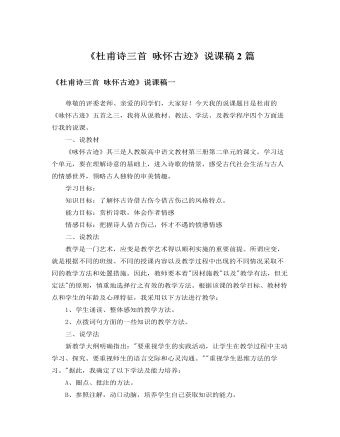
人教版高中语文必修3《杜甫诗三首 咏怀古迹》说课稿2篇
第三,说教学重点和难点。根据课程标准的具体要求、学生实际和社会实际以及教材的逻辑结构和教学体系,我认为本课的重难点是以下几个方面。教学重点:1.理解王昭君的形象2.深入理解杜甫在诗中的情感教学难点:理解寓意,把握主旨。第四,说教法与学法。教法:根据课文特点和学生实际情况,以诵读法(示范朗读、学生齐读)、问题探究法、点拨法、讨论分析法进行教学。首先激发学生学习本文的兴趣;然后引导学生反复吟哦诵读,在读的过程中质疑、思考、品析、鉴赏;最后在教师适当的点拨下,在集体的热烈讨论中,理解作者的感情,得到新的认识。(解说:使学生在教师的主导下围绕中心议题发表各自的意见,相互交流,相互启发,相互争议,激发他们主动去获取知识,培养健康情感。)
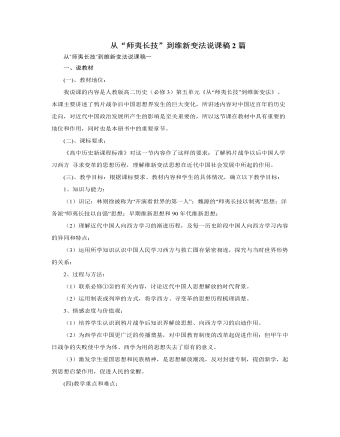
人教版高中历史必修3从“师夷长技”到维新变法说课稿2篇
(一)、教材地位:我说课的内容是人教版高二历史(必修3)第五单元《从“师夷长技”到维新变法》。本课主要讲述了鸦片战争后中国思想界发生的巨大变化,所讲述内容对中国近百年的历史走向,对近代中国政治发展所产生的影响是至关重要的,所以这节课在教材中具有重要的地位和作用,同时也是本册书中的重要章节。(二)、课标要求:《高中历史新课程标准》对这一节内容作了这样的要求:了解鸦片战争以后中国人学习西方 寻求变革的思想历程,理解维新变法思想在近代中国社会发展中所起的作用。(三)、教学目标:根据课标要求、教材内容和学生的具体情况,确立以下教学目标:1、知识与能力:(1)识记:林则徐被称为“开演看世界的第一人”;魏源的“师夷长技以制夷”思想;洋务派“师夷长技以自强”思想;早期维新思想和90年代维新思想;
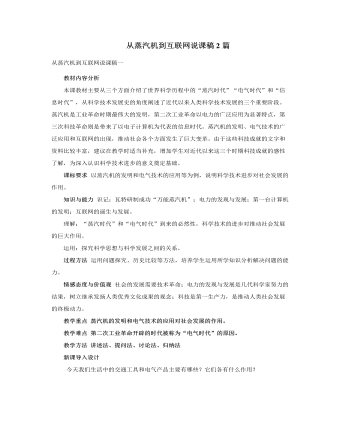
人教版高中历史必修3从蒸汽机到互联网说课稿2篇
2、互联网的功用:(1)功用:提供文件传输、电子信箱、聊天等服务,在社会各个领域发挥了巨大的作用,标志着信息化社会的出现。(2)特点:网络媒体作为一种新的传播媒体,具有界面直观、音色兼备、链接灵活和高速传输的特点。3、互联网的影响:教师提问,学生思考回答,教师总结 (1)信息经济在世界各地全面发展,加快了经济全球化的步伐;(2)传统产业也借助互联网提高管理水平,并通过全球营销和采购扩大市场;(3)在互联网时代,人们可以在家里完成很多工作,提高了工作效率,增加了乐趣;(4)人们的社会交往方式也发生着改变。(5)也带来一些负面影响。【合作探究】3:青少年如何对待网络:互联网在给社会带来巨大效能的同时,也带来了巨大的挑战。青少年应该提高自身的道德素养,树立正确的网络观,让网络发挥出应有的作用。

人教版高中政治必修3建设社会主义精神文明说课稿
最后,教师对这节课学习的内容做回顾总结,并让学生做几道练习题巩固一下新知识。依据:本节课主要是通过学生对关中文化的了解来学习我国的传统文化。所以我计划通过3-5分钟的设问导课让学生把注意力转变集中到课堂中,引导学生关注课堂。整体时间安排符合教育学中的最佳时间分配原理和反馈原理。这样做也有利于优化课堂结构、提高教学效率、把主要时间留给学生,把主动权还给学生。针对高三年级学生的层次差异,我进行了分层设置,设置有基础题和拔高题。这样做既可以使学生掌握基础知识,又可以使学有余力的学生有所提高,从而达到拔尖和“减负”的目的。板书设计板书就是微型教案,板书集中体现教学的三维目标、重难点、教学过程,体现教学的特色与特性。
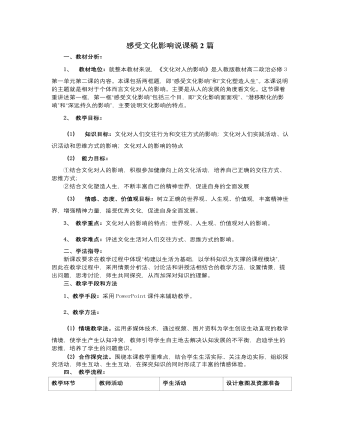
人教版高中政治必修3感受文化影响说课稿2篇
3、问题设计:文化除了影响人们的交往行为和交往方式外,还影响人们的什么?4、师生总结得出结论:文化影响人们的实践活动、认识活动和思维方式。设计意图:通过主题的指引,让学生查阅并说说中国传统节日的来源、传说和意义。这是基于丰富课程资源的设计,将生活和学习领域的多种资源纳入课程的范畴,在活动中自主建构知识,并在教师的引导下,提高分析和解决问题能力,培养热爱祖国的思想感情,突破本框题第二个重点。过渡设问:文化对人影响有什么特点?设计意图:通过问题提示,集中学生的注意力,导入下一个环节的教学。环节三:文化对人潜移默化的影响。教案:1、多媒体播放“孟母三迁”故事动画片。2、讨论问题:“孟母三迁”的故事给我们什么启示?3、师生总结得出结论:文化对人具有潜移默化的影响。设计意图:“孟母三迁”的故事学生比较熟悉,而且这个故事的思想教育性较强。